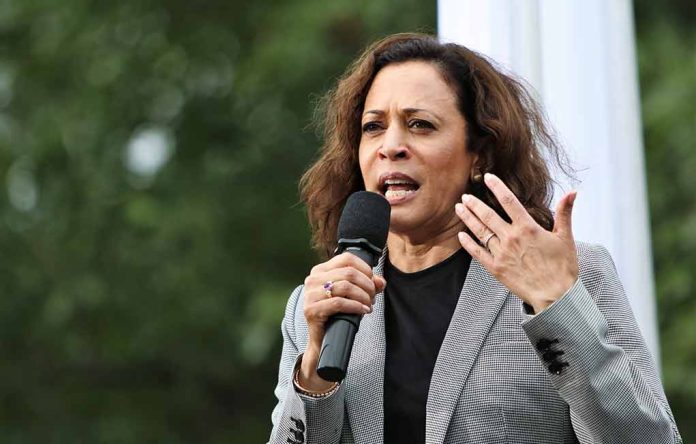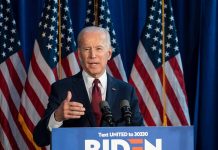
Vice President Kamala Harris finds herself under fire as criticism mounts over her handling of the $42 billion BEAD program aimed at expanding rural internet access.
At a Glance
- Nine Senate Republicans criticize Harris for mismanaging the $42.45 billion BEAD program.
- No new internet connections have been directly attributed to the massive investment.
- Critics argue that partisan requirements have caused significant delays.
- The program’s effectiveness is questioned as concrete results are not expected until 2025.
- Sen. Ted Cruz demands answers about an $849 million administrative fund.
Republicans Blast Harris’s Leadership
Vice President Kamala Harris, tasked with overseeing the Biden administration’s ambitious $42 billion Broadband Equity Access and Deployment (BEAD) Program, is facing mounting criticism from Republican lawmakers. The program, created by the 2021 infrastructure law, aimed to boost internet access in rural America. However, after nearly three years since its inception, the initiative has yet to produce tangible results.
Nine Senate Republicans, led by Minority Whip John Thune (R-S.D.) and Senate Commerce ranking member Ted Cruz (R-Texas), have publicly criticized Harris’s performance. In a strongly worded statement, they accused the Vice President of poor management and lack of effectiveness, drawing parallels to her role as “border czar.”
NEW
Senators write Vice President Kamala Harris over her mismanagement of a $42 billion program to expand Internet.
After
,
days “not a single person has been connected to the internet using the $42.45 billion.” pic.twitter.com/F6RUBgoNwq
— Brendan Carr (@BrendanCarrFCC) September 18, 2024
Delays and Regulatory Hurdles
The BEAD program, managed by the National Telecommunications and Information Administration (NTIA) under the Commerce Department, has been mired in bureaucratic red tape and regulatory requirements. Republicans argue that the administration has added “partisan, extralegal requirements” that have significantly delayed broadband deployment.
“It appears that your performance as ‘broadband czar’ has mirrored your performance as ‘border czar,’ marked by poor management and a lack of effectiveness despite significant federal broadband investments and your promises to deliver broadband to rural areas,” Senate Minority Whip John Thune (R-S.D.), Senate Commerce ranking member Ted Cruz (R-Texas) and seven others wrote.
These requirements include considerations related to climate change, broadband affordability, and union labor preferences. Critics argue that these additional stipulations have diverted focus from the program’s core mission of expanding internet access in underserved areas.
Lack of Tangible Results
Perhaps the most damning criticism of the BEAD program is the apparent lack of concrete results. Despite the passage of over 1,000 days since the infrastructure bill was signed, no new internet connections have been directly attributed to this massive investment. This glaring absence of progress has led to increased scrutiny of the program’s fiscal management and overall effectiveness.
The Biden administration defends the program, stating it is on track and following a 10-year timeline as intended by Congress. However, with concrete results not expected until 2025, the lack of visible progress is causing frustration and political finger-pointing, potentially impacting the Biden-Harris administration’s ability to showcase achievements before the upcoming election.
Financial Concerns and Accountability
Adding to the controversy, Senator Ted Cruz is demanding answers about a nearly billion-dollar administrative fund within the BEAD program. The National Telecommunications and Information Administration (NTIA) has reportedly diverted $849 million of BEAD funding for administrative purposes, raising questions about fiscal responsibility and transparency.
As the 2024 election approaches, the BEAD program’s struggles could have significant political ramifications, especially in swing states where rural internet access remains a pressing issue. The Biden-Harris administration faces mounting pressure to demonstrate tangible progress and justify the program’s substantial expenditure to an increasingly skeptical public and opposition party.
Sources:
- Senate GOP dings Harris’ role as ‘broadband czar’
- ‘People need to see it’: How politics hung up a $42B Biden internet buildout
- Kamala Harris’s $42 Billion Internet Fiasco: Where’s the Connection…and the Money?
- Kamala’s Broadband Bust: $42 billion, 1000 days, Zero Homes Connected
- Sen. Cruz Demands Answers on VP Harris’ Broadband Boondoggle
- With poor data, deficient requirements and little oversight, massive public spending still hasn’t solved the rural internet access problem
- FACT FOCUS: A look at false claims around Kamala Harris and her campaign for the White House











